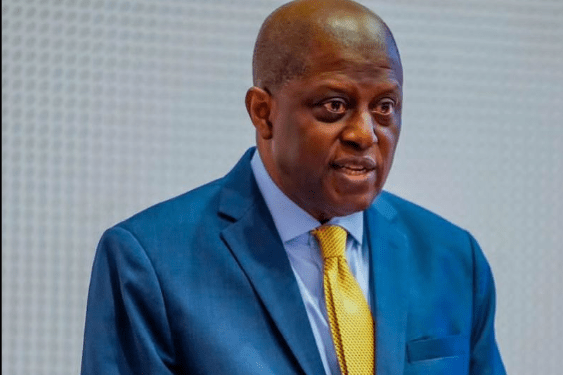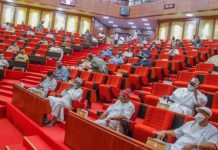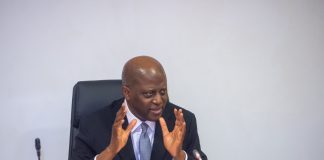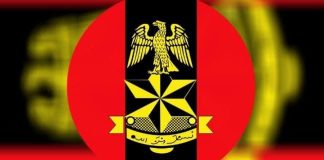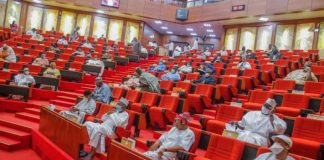🌿 Ruzu Non-Alcoholic Herbal Bitters
Ruzu Non-Alcoholic Herbal Bitters is a natural health supplement specially formulated to:
- ✅ Promote general wellness
- ✅ Detoxify the body
- ✅ Support the treatment of various ailments
Made from a powerful blend of 100% organic and medicinal herbs, Ruzu is completely alcohol-free, making it ideal for:
- 👪 All age groups
- 🌱 Health-conscious individuals
- 🌿 Anyone seeking non-alcoholic herbal remedies
Whether you're looking to boost your vitality, cleanse your system, or support healing the natural way, Ruzu Bitters offers a trusted herbal solution.
The Governor of the Central Bank of Nigeria (CBN), Olayemi Cardoso has blamed the excessive printing of the naira and other policies inutiated by his predecessor, Godwin Emefiele, for the current economic situation of the country.
He also listed the crash of oil prices in the international market as another cause of the problem.
Cardoso stated this on Tuesday at a press briefing at the end of the 297th meeting of the Monetary Policy Committee (MPC) held on from September 23-24 in Abuja.
Naomisophyblog earlier reported that Cardoso announced the committee’s decision to further raise the Monetary Policy Rate (MPR) which measures interest rates by 50 basis points from 26.75% to 27.25% to tighten the inflation rate which stands at 32.15%.
The MPC under Cardoso in the last year has raised the interest rate by 8.5%, from 18.75% in September 2023, to 27.25% 12 months later. Under Cardoso, the naira, which exchanged for around ₦700/$1 in September 2020, now sells for over ₦1,600/$1.
Asked whether the monetary policies of the apex bank including multiple interest rate hikes and the collapse of the foreign exchange windows are working considering the economic hardship Nigerians are facing, the CBN boss blamed his predecessor’s policies for the country’s monetary situation.
He said: “You can’t divorce the situation that has taken place with what happened in the last one year.
“We came into a very loose money supply situation between 2017 and 2023 and witnessed the pumping of liquidity into the system.
“In 2015, the money supply was about N19tn, and in 2023, it was N54tn. That’s a huge increase, a very huge increase. And then a substantial amount of that was through ways and means.
“So, essentially, the printing of money resulted in a huge amount of money chasing the same amount of goods or a relative amount of goods. I think that context is very important to have.”
Known as the Ways and Means, the apex bank offered short-term financing to the Federal Government to cover its budget shortfalls.
“Let’s not forget that we had a situation where global oil prices collapsed in 2015. With that collapse, unfortunately, and it is a fact of life, Nigeria is a monolithic economy.
“So, you are dependent for everything on oil, and as a result of the collapse of oil prices, the foreign exchange began to dwindle and it is important to understand that within this period, the response to that was lesser foreign exchange and fixing of foreign exchange prices and that also harmed the economy to no end,” he added.
Cardoso also said “attempt to harmonise the multiple exchange rates has brought about results” and Nigerians “no longer have multiple windows”.
He said the exchange rate is now more flexible and people can “transact their businesses through willing buyer, willing seller, as opposed to a situation where multiple exchange rates discourage and not allow that to happen”.
“I accept the fact that many outside are finding things very difficult but I want to say that the things we are doing are set to put the economy of this country in a trajectory where we shouldn’t go back and see some of the inefficiencies we’ve seen in our system over the recent past. These, I believe are short-term pains and I believe we will get out of the situation we are in now.
“Tough though they may, and I accept that they may be tough but we have no choice but to deploy these tools to reign in the excess liquidity in the system, the high inflation and encourage portfolio investors who had taken flight to come back and take interest in Nigeria,” the CBN governor concluded.
By: Babajide Okeowo
The post Cardoso blames money printing, oil price crash for Nigeria’s economic problems appeared first on Latest Nigeria News | Top Stories from Naomisophyblog.

